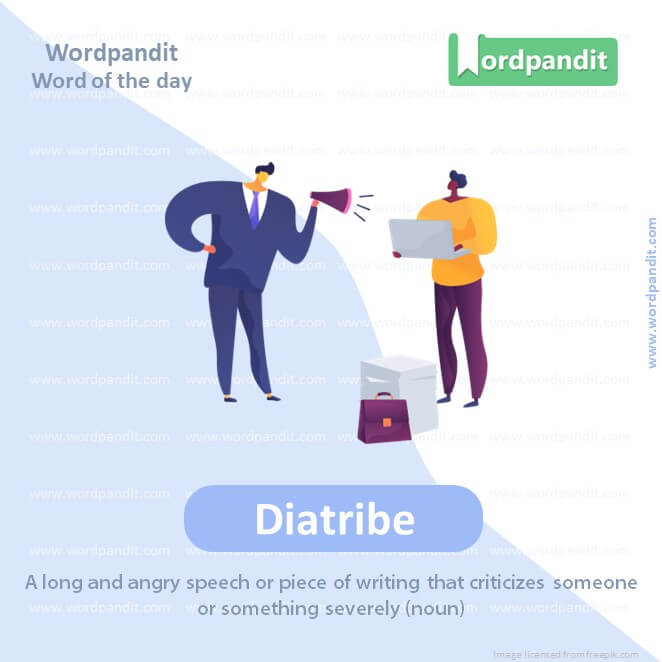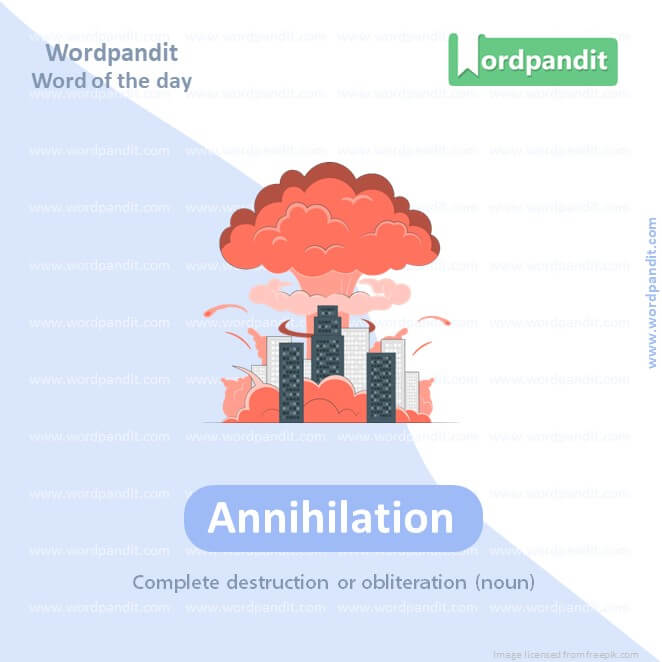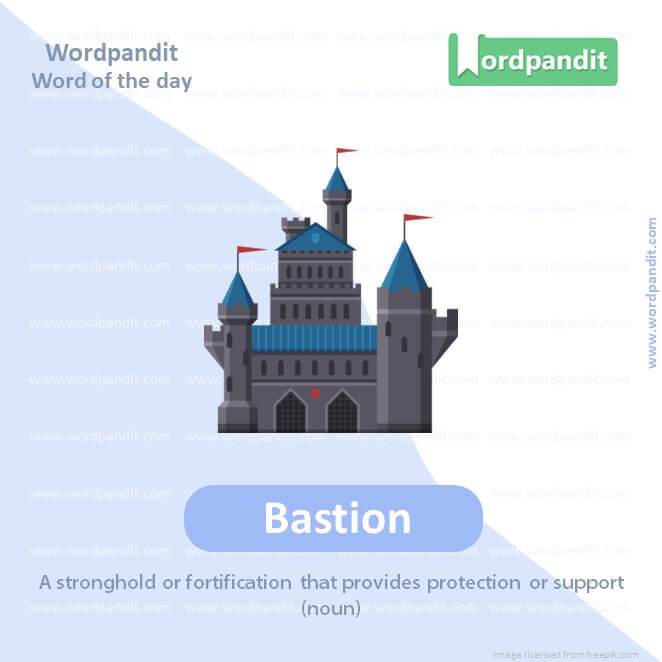Daily Vocabulary Words: List of Daily Used Words in Leading Indian Newspapers
Hi there. Welcome to this special section @ Wordpandit. Our endeavour here is straightforward: highlighting daily vocabulary words that you would come across in leading newspapers in the country. We have included the following newspapers in our selection:
• The Times of India
• The Economic Times
• Hindustan Times
• Mint
• Indian Express
We are putting in extensive work to develop your vocabulary. All you have to do is be regular with this section and check out this post daily. This is your repository of commonly used words; essentially, we are posting a list of daily used words. Hence, this has significant practical application as it teaches you words that are commonly used in leading publications mentioned above.
Visit the website daily to learn words from leading Indian newspapers.

WORD-1: Diatribe
CONTEXT: Social and other media have been agog with news of the diatribe against TM Krishna by musicians who have found it offensive that he should be conferred the “prestigious” Sangeetha Kalanidhi award by The Music Academy, Chennai.
SOURCE: Hindustan Times
EXPLANATORY PARAGRAPH: A diatribe is like a very long and angry speech where someone keeps saying bad things about another person or a group of people. It’s like when someone is really mad and just keeps talking in a mean way for a long time.
MEANING: A long and angry speech or piece of writing that criticizes someone or something severely (noun).
PRONUNCIATION: DYE-uh-tryb
SYNONYMS: Tirade, rant, harangue, denunciation, condemnation
USAGE EXAMPLES:
1. The politician’s speech turned into a diatribe against his opponents.
2. She launched into a diatribe about the poor service at the restaurant.
3. His column in the newspaper was a relentless diatribe against corruption.
4. The teacher stopped the student’s diatribe against the school policies.
WORD-2: Enduring
CONTEXT: The issue needs to be unpacked for what it tells us about the enduring bigotry of the entitled Tamil Brahmin community.
SOURCE: Hindustan Times
EXPLANATORY PARAGRAPH: Something enduring is something that lasts for a long time without changing or going away. It’s like your favorite toy that you’ve had for years and still love to play with.
MEANING: Lasting for a long time; continuing or existing for a prolonged period (adjective).
PRONUNCIATION: en-DYOOR-ing
SYNONYMS: Lasting, enduring, persistent, continuing, lasting
USAGE EXAMPLES:
1. Their friendship is enduring, lasting through many challenges.
2. The artist’s work has an enduring appeal to people of all ages.
3. The ancient ruins are a testament to the enduring nature of human civilization.
4. The enduring popularity of the book is remarkable.
WORD-3: Reflexive
CONTEXT: But Tamil Brahmins, as a community, have been remarkably un-reflexive besides being prone to projecting themselves as wronged and misunderstood.
SOURCE: Hindustan Times
EXPLANATORY PARAGRAPH: Something reflexive is something that happens automatically without you having to think about it. It’s like when you touch something hot and quickly pull your hand away without even deciding to do so.
MEANING: Describes an action that is done without thinking, almost as a natural reaction (adjective).
PRONUNCIATION: ree-FLEK-siv
SYNONYMS: Automatic, instinctive, spontaneous, involuntary, unconscious
USAGE EXAMPLES:
1. His reflexive response was to duck when he heard the loud noise.
2. She had a reflexive smile whenever someone mentioned her favorite hobby.
3. The reflexive action of blinking protects the eyes from harm.
4. The dog’s reflexive instinct was to bark at strangers.

WORD-4: Meritorious
CONTEXT: Their caste is attacked because they are successful and meritorious, and so criticisms are nothing but jealousy.
SOURCE: Hindustan Times
EXPLANATORY PARAGRAPH: Something meritorious is something that deserves praise or recognition because it is good or helpful. It’s like when you do something really kind or helpful for someone and they say you did a great job.
MEANING: Deserving reward or praise because of being very good or valuable
(adjective).
PRONUNCIATION: mer-i-TOR-ee-us
SYNONYMS: Praiseworthy, commendable, laudable, deserving, creditable
USAGE EXAMPLES:
1. Her meritorious actions in the community earned her a prestigious award.
2. The judge praised the defendant for his meritorious service to the country.
3. The charity received donations for its meritorious work in helping the homeless.
4. The team’s meritorious effort led to their victory in the championship.

WORD-5: Annihilation
CONTEXT: Their caste has been vilified and tormented for decades, thanks to the anti-Brahmin movement led by Periyar EV Ramasamy, who had called for their annihilation.
SOURCE: Hindustan Times
EXPLANATORY PARAGRAPH: Annihilation means complete destruction, as if something is wiped out completely. It’s like when you erase a drawing on a whiteboard and it disappears completely.
MEANING: Complete destruction or obliteration (noun)
PRONUNCIATION: uh-nahy-uh-LEY-shuhn
SYNONYMS: Destruction, obliteration, extinction, eradication, decimation
USAGE EXAMPLES:
1. The nuclear bomb caused widespread annihilation in the city.
2. The disease threatened the annihilation of the entire species.
3. The army’s attack led to the annihilation of the enemy forces.
4. The company faced financial annihilation after the market crash.
WORD-6: Dismissive
CONTEXT: Brahmins stand in for diversity), and as being careless and dismissive of all things that constitute “our” spiritual and cultural traditions.
SOURCE: Hindustan Times
EXPLANATORY PARAGRAPH: When someone is dismissive, they act like they don’t care about what you’re saying or doing. It’s like when you try to show someone your drawing, and they just look away without paying attention.
MEANING: Showing a lack of interest or concern; rejecting or ignoring something as unimportant (adjective).
PRONUNCIATION: di-SMIS-iv
SYNONYMS: Indifferent, unconcerned, uninterested, apathetic, neglectful
USAGE EXAMPLES:
1. His dismissive attitude towards her ideas hurt her feelings.
2. The manager’s dismissive response to the complaint disappointed the customer.
3. She gave him a dismissive wave and walked away.
4. The teacher’s dismissive tone discouraged students from asking questions.

WORD-7: Bigotry
CONTEXT: The caste bigotry on display in this instance appears to be locked in battle with a certain unmarked liberalism, which has become associated with the award as such.
SOURCE: Hindustan Times
EXPLANATORY PARAGRAPH: Bigotry is when someone has strong and unfair dislike or hatred towards people who are different from them, like their race, religion, or beliefs. It’s like not liking someone just because they like different things than you do.
MEANING: Intolerance towards those who hold different opinions from oneself (Noun)
PRONUNCIATION: BIG-uh-tree
SYNONYMS: Prejudice, intolerance, discrimination, bias, narrow-mindedness
USAGE EXAMPLES:
1. His bigotry towards people of other cultures was evident in his rude comments.
2. The law condemns any form of bigotry in the workplace.
3. She spoke out against the bigotry that was prevalent in society.
4. The school organized workshops to educate students about the dangers of bigotry.

WORD-8: Bastion
CONTEXT: This award, granted by a resolutely patrician institution, one viewed as a bastion of the twice-born? Admittedly, for a musician, even one like Krishna who has looked to break many boundaries which Carnatic musicians have drawn around their universe, the world of music sabhas, their patrons and the constituency that supports this music cannot be put away entirely.
SOURCE: Hindustan Times
EXPLANATORY PARAGRAPH: A bastion is like a strong fort or fortress that protects something valuable. It’s like a castle that keeps the bad things away and keeps the good things safe inside.
MEANING: A stronghold or fortification that provides protection or support (noun).
PRONUNCIATION: BAS-chuhn
SYNONYMS: Stronghold, fortress, citadel, bulwark, defense
USAGE EXAMPLES:
1. The old castle served as a bastion against enemy attacks.
2. The organization was seen as a bastion of traditional values.
3. The legal team acted as a bastion of defense for the accused.
4. The community center became a bastion of hope during difficult times.
WORD-9: Pedagogic
CONTEXT: There are likely affective and pedagogic relationships that he has experienced here, and which matter to him.
SOURCE: Hindustan Times
EXPLANATORY PARAGRAPH: Pedagogic refers to something that relates to teaching or education, like when your teacher uses different methods to help you understand a difficult lesson. It’s like when someone helps you learn something new in a fun and effective way.
MEANING: Relating to the methods and practice of teaching (adjective).
PRONUNCIATION: ped-uh-GOJ-ik
SYNONYMS: Educational, instructional, teaching, didactic, enlightening
USAGE EXAMPLES:
1. The new curriculum included pedagogic techniques to engage students.
2. Her pedagogic approach made learning math enjoyable for the students.
3. The conference focused on pedagogic innovations in early childhood education.
4. The school emphasized the importance of pedagogic training for teachers.
WORD-10: Transgressions
CONTEXT: It has been pointed out that if he was not of the Brahmin caste, his transgressions would not have been overlooked by the award committee.
SOURCE: Hindustan Times
EXPLANATORY PARAGRAPH: Transgressions are actions that go against rules or laws, like when you break a promise or do something you’re not supposed to do. It’s like when you eat cookies before dinner even though your mom said not to.
MEANING: Violations of rules, laws, or moral principles; acts of wrongdoing (noun).
PRONUNCIATION: tranz-GRESH-unz
SYNONYMS: Offenses, violations, infractions, breaches, misdeeds, transgressions
USAGE EXAMPLES:
1. The athlete’s transgressions led to a suspension from the team.
2. She regretted her transgressions and vowed to make amends.
3. The company’s financial transgressions were exposed by the audit.
4. The teacher addressed the students’ transgressions with a warning.
Vocabulary new Words
In the exuberant realm of language learning, nothing holds more thrill than the discovery of ‘vocabulary new words’. These gems of knowledge bring with them a fresh perspective and a deeper understanding of language. However, learning ‘vocabulary new words’ requires a methodical and focused approach.
The act of learning ‘vocabulary new words’ is a delve into linguistic novelty, often involving exposure to unfamiliar structures and meanings. Transcending the traditional approach of mere memorization helps in truly cementing newly learnt words into long-term memory. Interaction with a broad spectrum of written and spoken material, including novels, films, podcasts, and digital resources, provides a rich context of ‘vocabulary new words’ and significantly aids in their comprehension.
It’s noteworthy that unpacking ‘vocabulary new words’ is a steady process rather than a rushed one. A planned approach with a specific number of words, learned and reviewed each day, proves beneficial in effective learning. Coupling this method with technologies such as flashcards or memory-enhancement software can optimize the retention of ‘vocabulary new words’.
Integrating mnemonic devices and visual imagery is another highly efficient tool when learning ‘vocabulary new words’. Assigning unique stories or visuals to new words can enhance recall, making unfamiliar vocabulary much more approachable.
Lastly, practicing ‘vocabulary new words’ within daily routine is crucial for grasping their usage. Whether it’s through active utilization in conversation or incorporating these words in written communicative situations, application reinforces understanding.
In summation, mastering ‘vocabulary new words’ is an enriching pursuit that expands our linguistic horizons. However, a balanced approach, combining diverse reading materials, pacing your learning, employing memory-boosting strategies, and daily practice greatly streamlines the task. Embark on this fascinating journey, and let the ‘vocabulary new words’ fill your linguistic canvas with a fresh palette of expressions.













